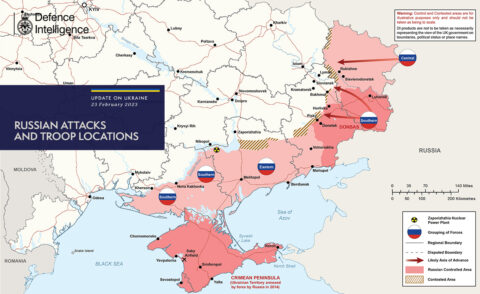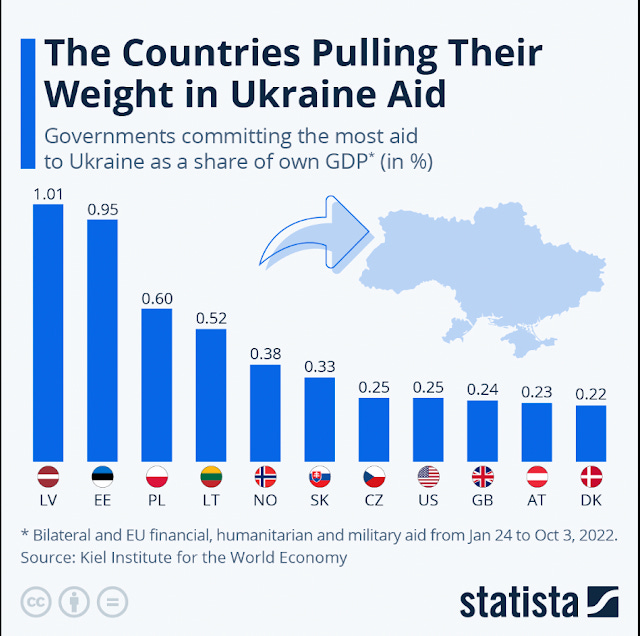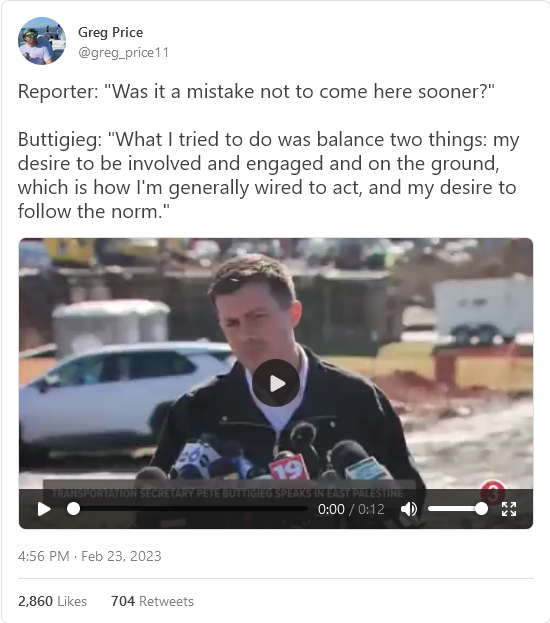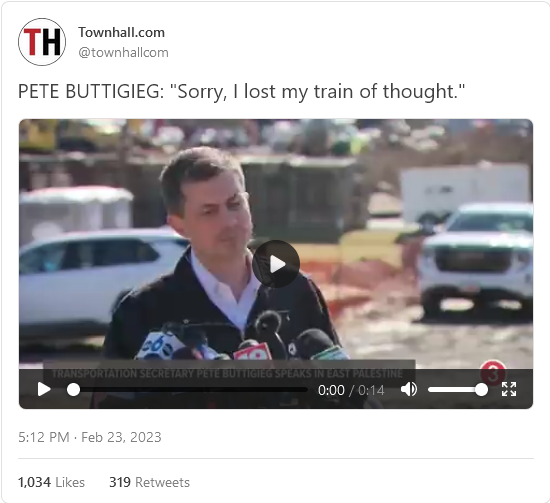Train of Thought
Published 4 Nov 2022In today’s video, we take a look at the Southern Railway “Leader” locomotive that was built like a diesel, powered by steam and had a lot pros and cons.
(more…)
February 28, 2023
The strange Steam Locomotive that was built like a Diesel – SR Leader Class
QotD: Politicians respond to different economic incentives than the rest of us
Politicians in particular have a problem – in good times, people vote for them, and in tough times … not so much.
The temptation is to delay the tough times until your successor can carry the can.
Poor old Keynes inadvertently gave politicians the answer they were looking for – the idea that during the downturn, the government should spend money into the economy to keep it going along nicely. Making sure that those lifeguards sacked from the Skegness lido can swiftly get jobs working at a government Skegness lido prevents them claiming the dole, and keeps them in the economy earning and spending until the economy washes out all the malinvestment and starts growing again. At which point the government Skegness lido closes and the lifeguards go to work at a lido somewhere where the biting Easterly wind doesn’t sandblast your skin off. The government has bridged the gap.
There’s one problem.
The government has no money of its own, so where will it get the money for their lido?
Well, Keynes said it should run a surplus during the good times and stash that surplus money away so it can be used during the downturn – a national rainy-day fund, if you will.
But guess what? Politicians don’t run surpluses.
Why would they? Every penny spent making lives better for voters today makes it more likely they will vote for you. And every penny saved against a rainy day makes it possible for your rivals to win votes tomorrow, by doing the same once they are in power.
So politicians don’t ever HAVE a rainy day fund. But that doesn’t stop them wanting to bridge the gap.
So they borrow the money.
And now what they are doing is not Keynesian, or even neo-Keynesian, but pseudo-Keynesian
By bridging the current gap with borrowed money, they simply make sure that the next gap will be costlier to bridge. Because the interest on the borrowing means that the gap will be wider.
But that’s not even the biggest problem – the biggest problem is that the gap is intrinsically important. We NEED it, to give us pause.
Whereas bridging it enables us to carry on being silly and prevents the misallocations from being flushed out – a lido remains operating in Skegness despite having no customers, and the lifeguards continue to work. Their lifesaving skills (which should be fruitfully employed elsewhere) stagnate at a lido with no punters. Their customer service skills deteriorate as the customers disappear, and what they learn instead is how to sit in a chair and stare into space. Their skills are degrading. Hysteresis, technically.
And so by delaying the collapse of the Skegness lido in pursuit of benign conditions for the voters, the government destroys the skills of our workforce.
Sowell was right – the problems we battle today were caused by the government’s interventions yesterday.
Surely using government to solve our problems is like a man quenching his thirst with seawater?
Alex Noble, “Drinking Brine”, Continental Telegraph, 2019-06-14.
February 27, 2023
The instinct to protect
Rob Henderson on the way that women react to men who demonstrate protective instincts toward them:
Human psychology evolved in environments far more violent than even the most dangerous modern U.S. cities. Overall, in the U.S., the average death rates from interpersonal violence are less than 1 in 10,000.
In contrast, in hunter-gatherer societies, 15 percent of deaths were the result of physical violence.
Our violent evolutionary past has shaped our minds. Even peaceable people in developed countries who have never even been in a fight can still readily estimate men’s physical strength from their face, body, and voice. These estimations tightly correlate with men’s actual physical strength.
A 2022 paper (preprint link here) investigated whether people prefer romantic partners who are willing and able to protect them from violence.
Considering the frequency and intensity of violence in the human ancestral environment, affiliating with people who were able to protect you would have been advantageous. The authors of the paper suggest such preferences have shaped human mating psychology.
The authors (Barlev, Arai, Tooby, and Cosmides) explore the question of whether a potential partner’s ability to protect you from violence is valued. It seems obvious that the answer (especially for women) is almost certainly yes.
However, they also explore whether a potential partner’s willingness (independent of ability) is also considered attractive.
When a woman judges a man, does learning that he is willing to protect her from violence make him more attractive, even if he isn’t particularly effective at doing so?
What about when a woman learns that a man is able but unwilling to protect her? Imagine a muscular guy who, upon seeing his date get mugged, just stands there and does nothing, or runs away.
Is he still more attractive than a guy who is unable but willing to protect her? Picture a scrawny guy who, upon seeing his date get mugged, physically tries but is unsuccessful in his attempt to stop the mugger.
The paper explores these questions.
[…]
Here you see that women rate male dates (described in this particular version of the study as average in physical strength and average in physical attractiveness) who make no attempt to protect them as a 2 out of 10 in attractiveness. Women rate a man who attempts to protect them but fails as a 7.5 out of 10. And a man who attempts to protect them and succeeds is an 8 out of 10.
So the major bump in attractiveness comes from willingness, rather than ability.
Luftwaffe Defeated in One Week?! – War Against Humanity 099
World War Two
Published 26 Feb 2023Allied and German Air Forces fight fierce battles over Europe with civilians caught in the crossfire, while Joseph Stalin and Lavrenti Beria deport two entire ethnicities of half a million in just one week.
(more…)
“From nine or so I could memorise all the dates of the kings and queens of England … all of which proved hugely useful when it came to impressing the opposite sex in my teens”
The preview portion of an Ed West article on how history should be taught as black comedy rather than a morality tale:
I love history; it is my greatest passion. If I didn’t have to worry about money I’d go and live in a former Templar castle in the Languedoc and spend my afternoons reading 19th-century French historians (pretending to read in the original for my Instagram account, obviously, but actually using a translation).
From a very young age I was obsessed with the subject. The first history tale I remember being engrossed by was the story of Ethelred the Unready and Edward the Martyr. I suppose I felt some sort of nominative solidarity with Edward, the rightful king murdered by a wicked stepmother who then put her own son Ethelred on the throne — and who turned out to be the worst combination of both useless and backstabbing.
Of course, I later learned that the story was more complicated; Edward may not have been murdered, and Ethelred was dealt a very difficult hand. But as a child it sent my mind away to a far off place in a similar way that King Arthur first captured the imagination of many others. Like them, I was first attracted to history via the medieval world, with its kings, castles and sword fights, and its colourful jousts where fair maidens watched heroic knights beat the crap out of each other (although the early medieval had almost none of those things, but again, don’t let that ruin the fun).
There was obviously a very nerdy aspect to this. From nine or so I could memorise all the dates of the kings and queens of England (although I got a bit vague when it got as far as the Edwys and Edwigs), all of which proved hugely useful when it came to impressing the opposite sex in my teens.
Dates are not the most important thing, but for a certain type of mind they make it easier to connect everything. If I learned of an insane pope who liked to torture his cardinals or “Wenzel the Drunkard“, the German king fond of throwing enemies off bridges, I could put it in context that this was the time of Richard II, and it is easier to place. If I’m now reading about Chinese emperors or what was happening in the Umayyad caliphate, where the connection with England would be slim or non-existent, my understanding of English dates still makes it easier to understand.
I loved the fantasy and the expanded sense of imagination, but as I got older, I came to better appreciate the most beautiful thing about history, that it’s all one great black comedy, filled with petty emotions and motivations, and the psychodrama and human absurdity is not some side issue, but the whole point.
Yet the subject is never really taught like that, and perhaps can’t be; and the national history curriculum when I was at school seemed structured in such a way as to suck all the life out of it. It’s not just the incoherence or emphasis; everyone complains about what is taught at school, and no one will ever be satisfied. But worse was the way the subject was almost designed to make it as boring as possible. An area of study was introduced, and then almost immediately we were asked to evaluate the primary and secondary sources; the aim was to invite scepticism, but most teens and pre-teens simply drift off at this point.
Just tell us the story — we can deconstruct it later. Personally, I feel that history shouldn’t be primarily an analysis of how hegemonic power structures orchestrate public relations; it shouldn’t be a morality tale about good and evil; it shouldn’t be a means to make society more inclusive; it should be fun, and when done correctly, it’s the most fun subject in the world.
I’ve heard a lot of other folks’ complaints about how history was taught when they were in school, and it generally aligns with my own experience. The overall plan seemed to be to actively avoid anything that might interest the students (battles, treachery, romance, excitement in general) and instead concentrate on treaty negotiations, lists of dates, and any other dry-as-dust ways to fill the lecture time. As anyone can tell by the subjects I tend to include here on the blog, I’m a big history nerd, but I actively hated the topic in school even as I was reading history for myself outside of school hours.
Ed also recommends the brilliant podcast series The Rest is History with Dominic Sandbrook and Tom Holland (now also available on YouTube, which is where I started listening to it a few weeks back). I’d read several books by each of them, so it was quite a treat to discover they were co-operating on a history podcast that more than met my expectations.
QotD: Sigmund Freud’s insights
Sigmund Freud was a perverted old cokehead, but he had some useful insights. One of them is that anxiety works like a spring (my paraphrase). You need a spring to have a certain tension in order to work, but if you compress it too tightly, it breaks. Anxiety that can’t be discharged (his term) in healthy, socially beneficial ways instead gets discharged in unhealthy, neurotic ways.
That’s what happened with Anna O., history’s most famous psychiatric patient. She had a very turbulent love/hate relationship with her father, as tightly wound girls do. When he became deathly ill on a family vacation, the unresolvable tension caused a whole host of physical symptoms, including hysterical paralysis. Pioneering psychologist Josef Breuer “talked her through” it, finally resolving the emotional conflict and “curing” the patient.
All this would’ve been interesting, but largely irrelevant, were it not for World War I. The world at large didn’t care about the problems of overprivileged Jewish girls, but they did care about their soldiers suddenly going crazy in the trenches. Once military doctors finally ruled out a physical cause, they were left with Freudian explanations: A soldier can’t stop fighting, because he’s an honorable, dutiful soldier. Yet that soldier must stop fighting. The only honorable way out is a wound. If the enemy doesn’t wound him, then, his subconscious will. Hence the bizarre “conversion disorders” — hysterical blindness, paralysis, mutism, etc. — characteristic of “shell shock.”
But a funny thing happened. While everyone now acknowledged the real power of the subconscious mind, we sort of … forgot … about it. Psychology, particularly psychotherapy, went back to being a ghetto Jewish preoccupation. Bored, over-privileged housewives might go to a shrink to talk through their “issues”, but as for the rest of us, well, if we weren’t going into combat anytime soon, why bother? Outside of a few crusty old reactionaries (like yours truly) making fun of SJWs, when was the last time you heard the word “neurotic”?
But that’s the thing: either the subconscious is real, or it isn’t. When we say “neurotic” (the few of us who still do), we usually mean people like Anna O. — rich, cosseted, politically active human toothaches who try to force the entire world into the all-encompassing drama of their Daddy Issues (see also: Virginia Woolf). But that’s not how Freud meant it. According to him, we’re all neurotic to some degree or another, because that’s just how anxiety works.
We all have strong emotional impulses that run counter our self-image. Hence the entire panoply of pop-Freudianism: The preacher who constantly rails against homosexuality from the pulpit is secretly gay (“projection”). The strict, controlling, everything-in-its-place type is a sadist (“anal-retentive”). The player who can’t settle down with any woman is actually trying to find a Mommy figure (“Oedipus complex”). And, of course, the — ahem — daddy of them all, the crippling Daddy Issues that make feminists such fun.
But that’s just the thing: Either anxiety works that way or it doesn’t. Just because we don’t see a specific syndrome in ourselves doesn’t mean we don’t have a whole bunch of anxiety we need to discharge. Just because it’s subclinical, in other words, doesn’t mean it’s not real, or unimportant. See for example the legions of keyboard commandos who show up in the comments of any blog with more than fourteen readers. Yeah, sure, it’s possible that those guys all got kicked out of SEAL Team 6 for being too badass … but it’s probably classic identification. They’re deeply uneasy about the world and their place in it, so they construct themselves an identity as the Rambo of Evergreen Terrace.
Severian, “High Anxiety”, Rotten Chestnuts, 2020-03-16.
February 26, 2023
The role of Vice President of the United States is, constitutionally, pretty lightweight
For most Americans, the Vice President is seen not only as potentially the next President but also as a fairly significant official in the administration, yet this isn’t the way the job was envisioned by the Founding Fathers, as Glenn Reynolds explains:
Mike Pence is arguing that the Vice President is a legislative, not an executive, officer. Mike Luttig has a piece in the NYT calling that crazy. (Link is to Josh Blackman’s blog post on same. Luttig’s piece is here, but it’s paywalled.)
Well, as it happens, I had a piece on the topic in the NYT over a decade ago, and I’ve also authored a piece in the Northwestern University Law Review on the topic, and I say he’s not crazy.
Nowadays, we tend to think of Vice Presidents – wrongly – as a sort of junior or co-President, but that’s not actually how it works at all. As I wrote in the Northwestern Law Review piece:
The Constitution gives the Vice President no executive powers; the Vice President’s only duties are to preside over the Senate and to become President if the serving President dies or leaves office. Traditionally, what staff, office, and perquisites the Vice President enjoyed came via the Senate; it was not until Spiro Agnew mounted a legislative push that the Vice President got his own budget line. The Vice President really is not an executive official. He or she executes no laws — and is not part of the President’s administration the way that other officials are. The Vice President cannot be fired by the President; as an independently elected officeholder, he can be removed only by Congress via impeachment.
In various cases involving the Executive power, the Supreme Court has placed a lot of weight on the question of whether an official can be fired by the President or not.
Continuing:
Traditionally, Vice Presidents have not done much, which is why the position was famously characterized by Vice President John Nance Garner as “[not] worth a pitcher of warm spit”. That changed when Jimmy Carter gave Fritz Mondale an unusual degree of responsibility, a move replicated in subsequent administrations, particularly under Clinton/Gore and Bush/Cheney.
The expansion of vice presidential power, however, obscures a key point. Whatever executive power a Vice President exercises is exercised because it is delegated by the President, not because the Vice President posesses any executive power already. The Vesting Clause of Article II vests all the executive power in the President, with no residuum left over for anyone else. Constitutionally speaking, the Vice President is not a junior or co-President, but merely a President-in-waiting, notwithstanding recent political trends otherwise. To the extent the President delegates actual power and does not simply accept recommendations for action, the Vice President is exercising executive authority delegated by the President while being immune to removal from office by the President, unlike everyone else who exercises delegated power. The only recourse for the President is withdrawal of the delegation, with instruction to subordinate officials within the Executive Branch not to listen to the Vice President. However, it seems pretty clear that the President is not allowed to delegate executive power to a legislative official, as that would be a separation of powers violation.
The point of my argument there was to note that, by arguing that Vice President Cheney was not subject to the Freedom of Information Act because he was a legislative official, the White House had raised the question of whether President George W. Bush’s extensive delegation of executive powers to Cheney was unconstitutional. (Hence the title, “Is Dick Cheney Unconstitutional?”)
Tojo Takes Control – Week 235 – February 25, 1944
World War Two
Published 25 Feb 2023Now that the Americans have seized the Marshall Islands, they can bypass the Japanese base at Truk. This impels Prime Minister Hideki Tojo to shake up both army and navy command, and he even takes personal control over the Japanese Army. On the Anzio Front, Lucian Truscott replaces John Lucas as Allied Commander. In the field, the Allies win a big victory in Burma, and in Ukraine, the Soviets are still on the move.
(more…)
Politicians who ignored warnings now demanding to know why nobody warned them
The Canadian government is moving to pass a new law to force “Big Tech” companies like Google and Facebook to pay Canadian broadcasters and newspapers whenever they post a link to one of those sites. The government was told many times that this law wouldn’t produce a cornucopia of new funding for Canadian companies, but would instead get them nothing — in fact, worse than nothing — as Big Tech firms would just ignore Canadian news altogether (possibly even blocking their own users from posting those links). Despite that, now that Google announced they were testing their ability to shut off linking to Canadian sites, the PM and the minister responsible for the new bill are acting as though it’s Google and the other tech firms making threats:
The report that Google is conducting a national test that removes links to Canadian news sites for a small percentage of users sparked a predictable reaction as politicians who were warned that Bill C-18 could lead to this, now want to know how it could happen. None of this week’s developments should come as a surprise. Bill C-18 presents Google and Facebook with a choice: pay hundreds of millions of dollars primarily to Canadian broadcasters for links to news articles or stop linking. Both companies are doing precisely what they said they would do, namely considering stopping linking (Google conducted the same tests in Australia several years ago). Indeed, strip away the hyperbole and the bottom line is this: the costs of Bill C-18 are enormous (the government’s Senate representative suggesting the bill could result in revenues to cover 35% of news expenditures of every news outlet in Canada) and the revenues from news for the platforms are not (Facebook says news only constitutes 3 percent of posts and Google does not even run ads on its Google News product). As some have noted, the government says the companies are stealing content if they link and blocking content if they don’t.
Canadian Heritage Minister Pablo Rodriguez has blithely ignored the risks associated with Bill C-18 for months. By mandating payments for links, the bill creates a real threat to the free flow of information online. It also raises press independence concerns, may violate Canada’s international copyright obligations, harm the competitiveness of independent media, and open the door to trade retaliation by the United States. But as the Google test demonstrates, everyone loses with the current bill. Trust in Google is undermined when it secretly degrades its own service, news organizations won’t see new revenues if the companies stop linking and they will also lose the benefits of the links, and Canadians will find that the bill is an own-goal by the government that undermines the foundation of the Internet.
No one likes to get called on their assertions that Google and Facebook were bluffing when they warned that the prospect of removing news sharing or search results was real, but it is telling that Rodriguez and the bill’s supporters continue to rely on misleading claims about the bill instead of making the case for its actual impact. For example, consider yesterday’s Rodriguez’s tweet:
Leaving aside the fact that Google is blocking links to news sites, not the news sites themselves, Rodriguez continues to falsely claim that the premise of the bill is for the tech companies to “compensate journalists when they use their work.” This just isn’t what the bill does. First, it now includes hundreds of broadcasters that do not even produce news, yet still qualify for compensation. That isn’t compensating for use, it is payment based on holding a CRTC licence. Second, the bill does not require compensation based on use. The standard in Bill C-18 is making news content available, which is defined as:
For the purposes of this Act, news content is made available if
(a) the news content, or any portion of it, is reproduced; or
(b) access to the news content, or any portion of it, is facilitated by any means, including an index, aggregation or ranking of news content.Google and Facebook don’t typically reproduce the news. Rather, they link to it and thereby send the user to the publisher’s own platform where the publisher benefits from increased traffic and potential ad revenue. Therefore, the key provision is (b), which covers facilitating access to the news, better known as linking to it. That is not how most Canadians would conceive of use and why officials typically avoid acknowledging that the bill is about payment for links.
I tapered off linking to Canadian newspapers the last time this idea was being tossed around, and clearly I’ll need to omit ever linking to Canadian broadcasters and newspapers in future … but given that easily 90% of my readers aren’t Canadian, it’s not going to be too much of a sacrifice.
Ortgies Automatic Pistols: Not as Boring as You Think!
Forgotten Weapons
Published 16 Jun 2016The Ortgies is a pistol whose interesting aspects are often overlooked on the assumption that it is just another identical .32 ACP blowback pistol. Well, it is that — but it is also more.
Mechanically, the Ortgies has a rather unusual grip safety mechanism that is quite different from what we expect to see today. It is also interesting in that the .32 and .380 versions differ only in the easily-interchanged barrel — even the magazines are marked for both calibers.
However, the most interesting part of the Ortgies story (in my opinion) is its production. In less than 5 full years (1919-1923), close to a half million of these guns were made, primarily by an industrial subsidiary of the German government. The guns were in large part a work program, creating export goods which could bring desperately needed hard currency into Germany to counteract the economic devastation of the Versailles treaty.
Have a look at the video and you may come away with a newfound appreciation for the humble Ortgies, like I did!
(more…)
QotD: Scientology versus psychiatry
Scientology has a long-standing feud with psychiatry, with the psychiatrists alleging that Scientology is a malicious cult, and the Scientologists alleging that psychiatry is an evil pseudoscience that denies the truth of dianetics. And that psychiatrists helped inspire Hitler. And that the 9/11 was masterminded by Osama bin Laden’s psychiatrist. And that psychiatrists are plotting to institute a one-world government. And that psychiatrists are malevolent aliens from a planet called Farsec. Really they have a lot of allegations.
Scott Alexander, “The APA Meeting: A Photo-Essay”, Slate Star Codex, 2019-05-22.
February 25, 2023
One year into Vladimir Putin’s “Three-Day War”
Tsar Vlad launched his short, victorious war a full year ago, expecting to have the troops home by spring if not sooner. It hasn’t worked out to his timetable at all. Ukraine still stands, although it’s taken one hell of a battering in the process and drawn in more and more vocal support in the west, which has belatedly been followed by actual military supplies and equipment to replace those expended holding back the Russian forces. CDR Salamander follows up his predictions from last year on how things looked to him at that moment in time:
On the day the war started I made 7-points. Let’s review them and see how I did back on 24 FEB 22.
1. The remaining delusions about the post-Cold War security arrangements in Europe should be firmly buried. History is back and she has her Festivus pole front and center. She has some issues with us, and we’re going to hear about it.
This continues to get firmer and displayed in stark relief. All the “offsets” and “transformations” and “war is new” snake oil sold the last few decades really should not be allowed to have any public space besides to say, “I was wrong.” Rest assured, that won’t stop them — but the issues we raised over the almost 18-yrs of this blog and 14-yrs of the Midrats Podcast remain true. From the shallow magazines to the fact you never have enough large caliber guns to no war is short … we — and a lot of other people tut-tut’d for years — were correct.
2. NATO has a German problem. While all the “right people” will not shut up about how wonderful former Chancellor Angela Merkle was, people need to be very clear eyed about what a complete disaster she and the German political class have been over the last two decades. They have starved what should be continental European NATO’s most potent military into irrelevance. Her disastrous feel-good, ethno-masochistic immigration policy weakened European cohesion and fed the worst parts of European political subcultures. Yes, she made a lot of well meaning Germans feel good about themselves, but it was a sugar-high that rotted the teeth and poisoned the national metabolism. While willing to defend Europe to the last Pole and Germany to the last American, she decided to preen in her neo-pagan EuroGreen superiority onomastic politics by ditching clean nuclear power and through the complete corruption of her elite, shacked herself to Russian energy oligarchs and thus the Kremlin. Germany needs to fix herself, and NATO needs to work around her and punish her until she starts to behave like a constructive 21st Century security partner.
Germany has made great progress, but is being dragged kicking and screaming in to the 21st Century.
3. As our friend Jerry Hendrix pointed out yesterday, the moral leaders in NATO right now are the Baltic Republics and I would add Visegrad nations. You can throw Romania in there too. France will go hot and cold as she fights her desire to do the right thing for European security while at the same time nurse her 1,000 year old drive to be the premier leader of Western Europe. Serious but weaker nations will lean on a reluctant USA and limited United Kingdom … simply because — to be frank — much of the rest of the alliance is not that capable.
I think this graph tells that story well;
The front-line nations are putting their money where their existential threat is.
4. In line with #1 above, it is time for Finland at least, and probably Sweden, to join NATO. They both have a long and bloody history with the Russians and should see clearly what time it is.
Another check.
5. Ukraine waited too long to rearm. Weakened and distracted by a corrupt elite, the good parts of her nation could not get ready fast enough. After the first Russo-Ukraine war of 2014 she should have modeled the armed neutrality of Switzerland with a civilian populace trained and armed to the teeth. As we’ve discussed here before with the former Soviet republics and Warsaw Pact nations, every village needs a few ATGM militia teams trained to slow any advance through their patch of land. If Ukraine can, in whole or part, survive without vassalhood, perhaps they could get there. They can only get there if they build a nation people are willing to fight and die for.
Everyone is rediscovering the utility of a good military-industrial complex that can quickly grow to scale. Amazing what the green-eye-shade accounts forced those who actually are supposed to study war to believe.
A few days ago, Dominic Sandbrook explained that the Ukraine-Russia conflict “is not complicated”:
A year ago, as Vladimir Putin launched his so-called “special military operation” to seize the Ukrainian capital, kill Volodymyr Zelenskyy and wipe much of the latter’s country from the map of Europe, who’d have imagined that the third week of February 2023 would begin with Joe Biden strolling around the streets of Kyiv in sunglasses? For that matter, who would have predicted that Mr Zelenskyy, only recently returned from his own trip to London, would be at his side — still the president of a free country, and still very much alive?
Sometimes it’s nice to be wrong. Like many, probably most Western observers, I held out little hope for Ukraine once the drums of war began to beat in earnest. A couple of days after Mr Putin’s brutal invasion began, I wrote a bullish essay looking back at Ukraine’s history of suffering and resilience. But even as I was agonising over my prose, the bleak news continued to pour in. “Now, while I have been writing, Russian tanks are rolling into the suburbs,” I wrote at one stage. Did I think they would be driven back? I didn’t. “Kyiv will rise again,” I wrote at the end. Stirring words, or so I hoped. But the person I was really trying to persuade was myself, and I didn’t succeed.
In truth, I underestimated the Ukrainian people’s resilience, their courage, their love of country. And I was wrong, too, about the Western alliance. After more than a decade of drift and inaction, from the shameful failure to respond to the seizure of Crimea to the near-criminal indifference to the suffering in Syria, I doubted whether any major Western leader would make more than a token protest about the first full-scale European invasion since the Forties. I never expected to see Finland and Sweden jump off the fence and apply for Nato membership. Nor did I imagine that Joe Biden would be so unswerving in his commitment, or so generous with US military aid. Above all, I never anticipated that Kyiv would hold out, that Kharkiv would stand or that Kherson would be retaken. As I say, it’s nice to be wrong.
It’s often said that the war in Ukraine feels like a throwback, returning us to an age when nationalistic strongmen nursed atavistic dreams of conquest, sending thousands of men to die so that they might scratch new frontiers into the soil of Europe. For all the drones and social media gimmicks, the fighting certainly feels old-fashioned: reading David Patrikarakos’s harrowing dispatch from the front line in Bakhmut, it’s impossible not to think of Passchendaele or Verdun. But for a child of the Seventies, perhaps the most old-fashioned thing of all is the spectacle of a genuinely clear-cut conflict, an unambiguous clash of right and wrong, that feels closer in spirit to the struggle against Hitler’s Germany than to most of the wars in my lifetime.
Andrew Sullivan is convinced that the war is just, but worries whether it is prudent — and he calls it not Ukraine’s but “the West’s defensive war against Russia”:
It is right and just to defend a sovereign country from attack by a much larger neighbor; to fight back against an occupying force committing war crimes on a massive scale; to oppose the logic of dictatorships and defend the foundations of democracy; to uphold a post-Cold War international order which forbids the redrawing of borders by force; to unite democratic countries in Europe against a resurgence of imperial Russia; to defang and defeat a poisonous chauvinism that despises modern freedoms for women and gay people.
It is indeed right and just. But is it prudent?
That’s the question I’m still grappling with, in a week which saw the conflict deepen and the two sides entrench their positions further. President Biden’s trip to Kyiv and his speech in Poland have heightened the stakes, turning this into a more obvious proxy war between the United States and Russia … edging gingerly but relentlessly toward something more direct.
He’s all in now: declaring that Ukraine “must triumph” and that Russia cannot win a war that the Russian leader deems existential. NATO armaments are pouring into Ukraine at an accelerating rate. The training of Ukrainian troops is happening across the Continent. Germany is sending tanks. Pressure is building on Britain to send fighter jets.
The US is ratcheting up arms production as fast as it can, while seriously depleting our own Stinger surface-to-air missiles, 155mm howitzers and ammunition, and Javelin anti-tank missile systems. These are good times for arms producers:
The Army is planning a 500% increase in artillery shell production, from 15,000 a month to 70,000, according to Army acquisition chief Doug Bush … and intends to double the production of Javelin anti-tank missiles, make roughly 33% more Guided Multiple Launch Rocket Systems surface-to-surface medium-range missiles a year, and produce each month a minimum of 60 Stinger anti-aircraft missiles — which were “almost not in production at all”, according to Bush.
When Ukraine’s effective military is made up almost entirely of NATO equipment, and trained by NATO forces, there surely comes a point at which claiming NATO is not actually at war with Russia gets fuzzy.
Rise of Franco – The Spanish Rif War 1921-1926
The Great War
Published 24 Feb 2023The Rif War between Spain and the Rif Republic gave rise to a young Spanish officer named Francisco Franco — who later would become Spanish dictator. After Spain had almost lost the war against the Rifi people, they got help from France and WW1 hero Philippe Pétain.
(more…)
Buttigieg isn’t covering himself in glory over his belated East Palestine train derailment response
Jim Treacher is clearly trying to at least pretend some sympathy for Transportation Secretary Pete Buttigieg, but it’s a tough assignment:
Pete Buttigieg is the type of guy who walks into a job interview and says his biggest weakness is his perfectionism. As a kid he always had an apple for the teacher, and if she forgot to assign homework that day, he was the first with his hand up. He’s a repulsive little hall monitor, so all the other repulsive little hall monitors think he’s simply divine.
Mayor Pete and his fan club are having a really bad time right now, because for once he’s expected to actually do something. Producing results simply isn’t his specialty. After spending three weeks hoping the East Palestine, Ohio rail disaster would stop bothering him if he just ignored it, he finally showed up there yesterday.
And I’m starting to understand his reluctance:
What a visual, huh? He looks like a little kid playing Bob the Builder. It’s not quite Dukakis in the tank, but it’s close.
And then it got worse: He started talking.
He’s just so gosh-darn dedicated to his job, you see. His only mistake was listening to you people. He followed the norm. This is your fault!
And then he blurted out this instant classic:
Now, which of those words should you try to avoid when you’re talking about a disastrous train derailment? I’m starting to suspect this guy isn’t the unparalleled megagenius the libs keep telling us he is.
[…]
Team Pete is more concerned about reporters asking about East Palestine than about the disaster itself. The rest of us are just an abstraction to them. If they accidentally manage to help some of us, that’s fine. If not, that’s also fine. Either way, we cannot be allowed to stand in the way of their political aspirations.
Mayor Pete really did think this gig would be a cinch, didn’t he? Like, he could just do all the reading the night before the final and ace it. He’s positively resentful at being expected to do what we’re paying him to do. He thinks he’s too good for this job, which is why he’s very bad at this job.
Will Buttigieg’s tenure as transportation secretary ruin his presidential prospects? After all, that’s what this is all about for him. Maybe, maybe not. It’s not as if politics is about solving problems. All you have to do is claim you solved the problems, and your team will cheer for you no matter what.












